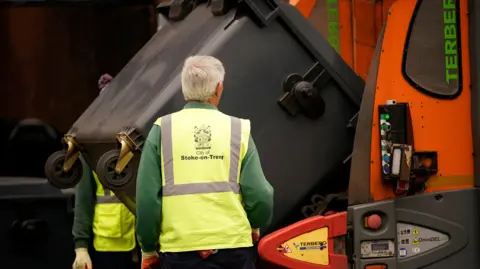English councils to get £700 million budget top-up next year

 getty images
getty imagesThe Government has announced an extra £700 million to English councils’ budgets next year as a “first step” to rebuilding their finances.
The top-up brings in around £2 billion of extra funding for next year, on top of the £1.3 billion announced in the October budget.
But £515 million of new funding is earmarked to offset the impact of a rise in National Insurance (NI) contributions from next April.
The Local Government Association, which represents councils, said authorities will still “struggle to balance the books” amid wider funding pressures.
Like the previous government, they will be able to increase council tax by 5% without a local vote, with a local increase to be announced next year.
The provisional figures cover spending from April next year, and will be subject to consultation and possible revision in February.
Additional funding for next year includes £600 million which will be allocated to councils according to their level of deprivation, as well as a separate grant to help rural councils provide “repurposed” services.
Ministers argue this would make the system fairer because councils in poorer areas are less able to raise income locally, but it has prompted a backlash from the County Council Network, which represents large county authorities.
CCN said rural areas were set to suffer, and argued that deprivation “is not a leading indicator of which councils are in the most financial distress”.
This argument is set to grow louder next year, when the government discusses introducing a stronger link between overall funding and deprivation from 2026 as part of wider changes to council funding.
Ministers say the new formula will take into account the “impact of rurality” – but they may have a political dispute on their hands, with Tory councils in more rural areas likely to argue they are being shortchanged.
monthly bills
Other future changes include a move towards a multi-year funding settlement, a Labor manifesto promise, the government’s promise that the budget will cover a minimum of two years.
Council tax bills will also now move to monthly payments by default, rather than spreading payments over 10 months, with taxes for social care displayed separately and more information on how the taxes are spent.
Next year’s settlement includes an extra £200m to help councils with responsibility for adult social care provide subsidies for care costs, bringing the total funding to the sector next year to £3.7bn.
Although the cash boost is likely to be welcomed by the sector, providers have expressed concerns about the impact of rising National Insurance (NI) costs.
tax increases
Charitable and private sector providers are ineligible for the funding pot reserved to compensate public sector bodies, although the Prime Minister’s spokesman said plans to reduce the increase in hospices would be announced before Christmas.
Although councils would share £515 million to offset the NI increase for their staff, CCN argued that this amount would not be enough to offset indirect costs from council services provided by private providers.
The LGA has also argued that the additional costs for contractors would mean that some council services would become more expensive to provide.
Shadow local government minister David Simmonds said the government funding was “beautifully packaged” but that councils would find “the box is a little emptier than people expect” given the funding pressures they face.
He said councils also faced uncertainty over the cost of funding local elections next year, as the Government this week confirmed plans to merge councils as part of a programme. Big change in council map,





